Article Review Report: Ethical Decision Making in Business, Leadership
VerifiedAdded on 2021/02/19
|9
|3041
|19
Report
AI Summary
This report provides an in-depth review of the article "A model for ethical decision making in business: Reasoning, intuition and rational moral principles." The review highlights the importance of ethical principles in guiding leaders and managers to make strategic decisions for the betterment of the company. The report discusses various ethical principles such as truthfulness, confidentiality, autonomy, beneficence, non-maleficence, honesty, fairness, commitment, and justice, and explains how these principles contribute to the success of a business. The review emphasizes the benefits of ethical decision-making, including a positive market image, productive staff members, reduced legal problems, and increased productivity. It also explores how ethical behavior builds stronger bonds between employees and management, creating stability within the organization. The report concludes by stressing the significance of adhering to moral principles for long-term sustainability and competitive advantage.
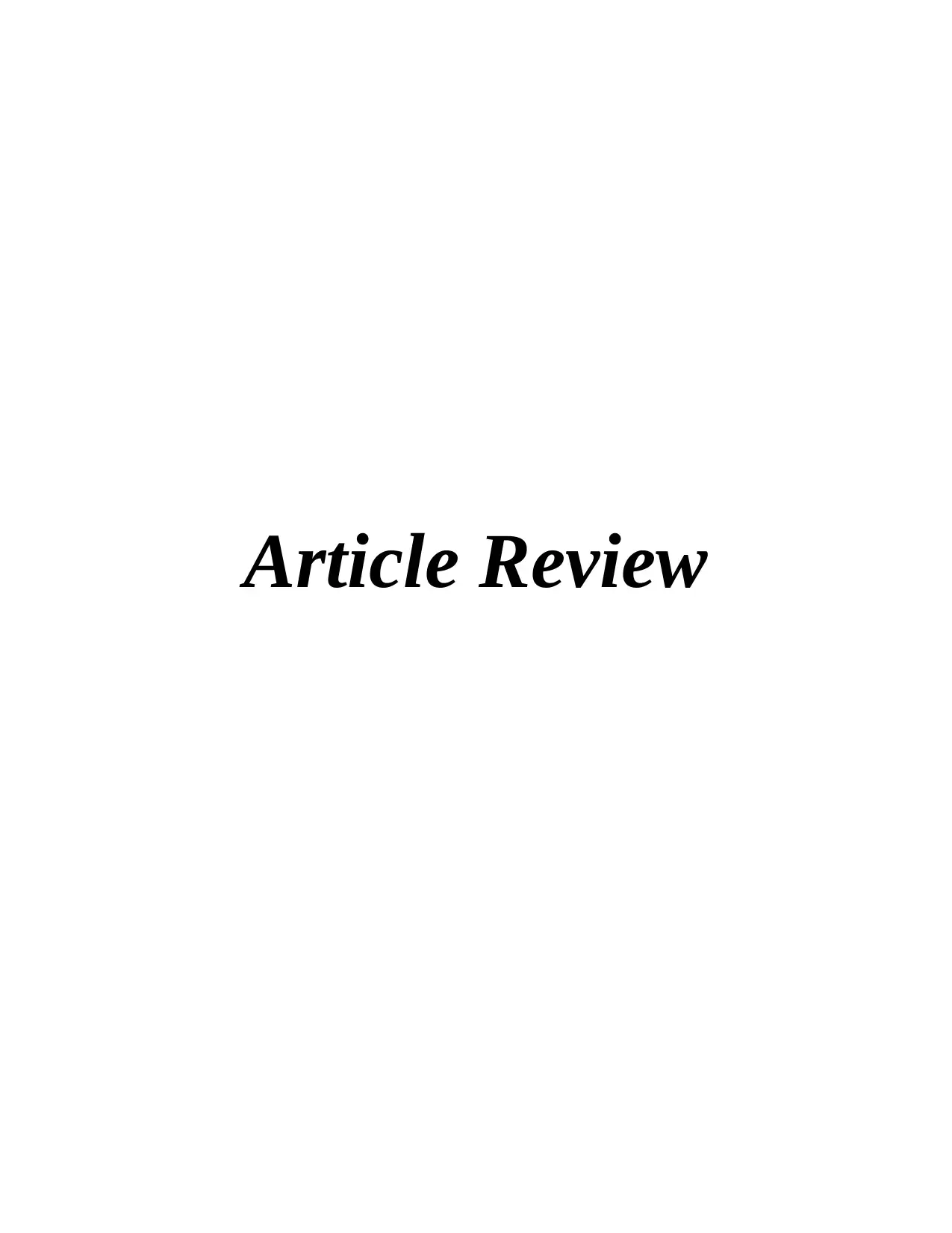
Article Review
Paraphrase This Document
Need a fresh take? Get an instant paraphrase of this document with our AI Paraphraser
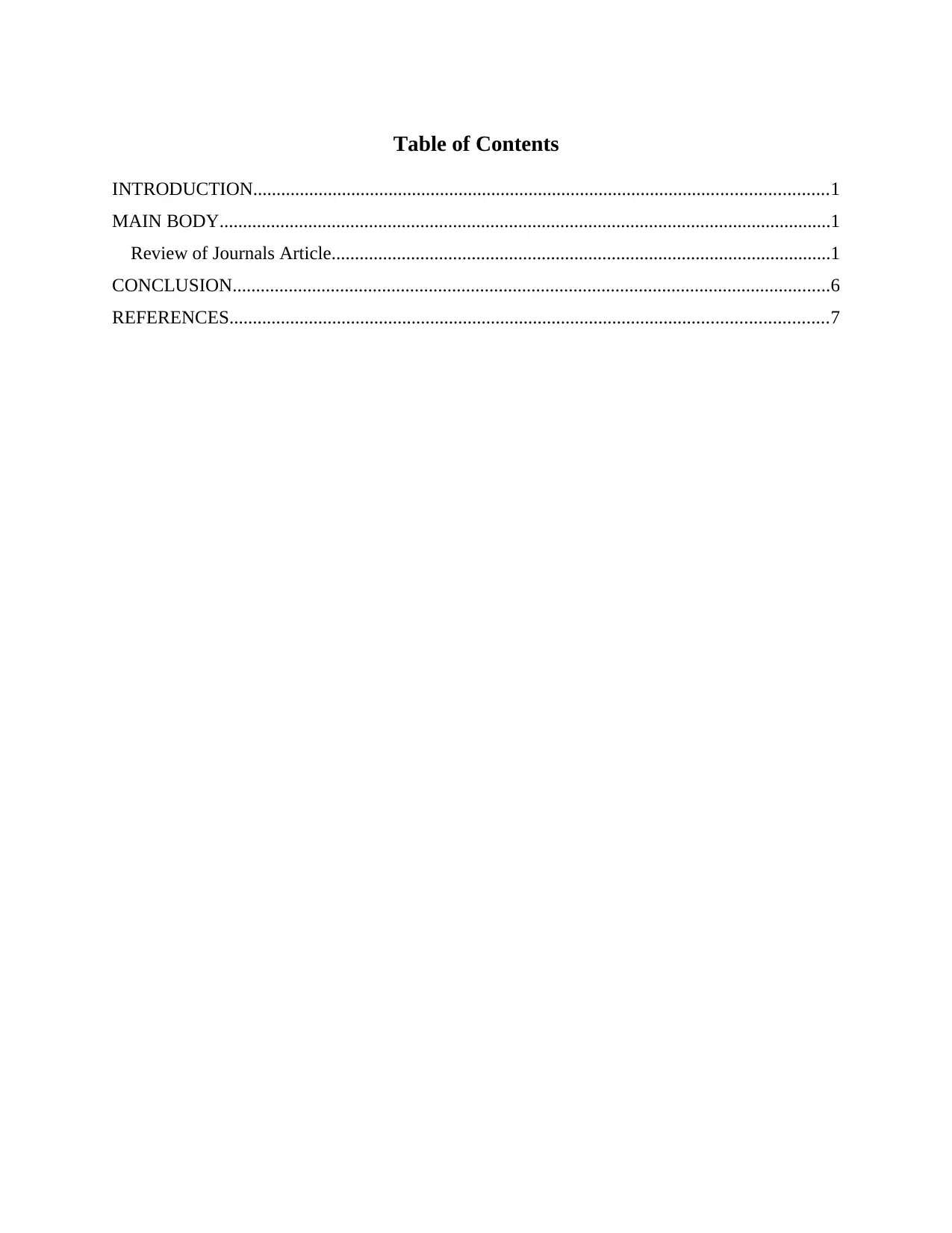
Table of Contents
INTRODUCTION...........................................................................................................................1
MAIN BODY...................................................................................................................................1
Review of Journals Article...........................................................................................................1
CONCLUSION................................................................................................................................6
REFERENCES................................................................................................................................7
INTRODUCTION...........................................................................................................................1
MAIN BODY...................................................................................................................................1
Review of Journals Article...........................................................................................................1
CONCLUSION................................................................................................................................6
REFERENCES................................................................................................................................7
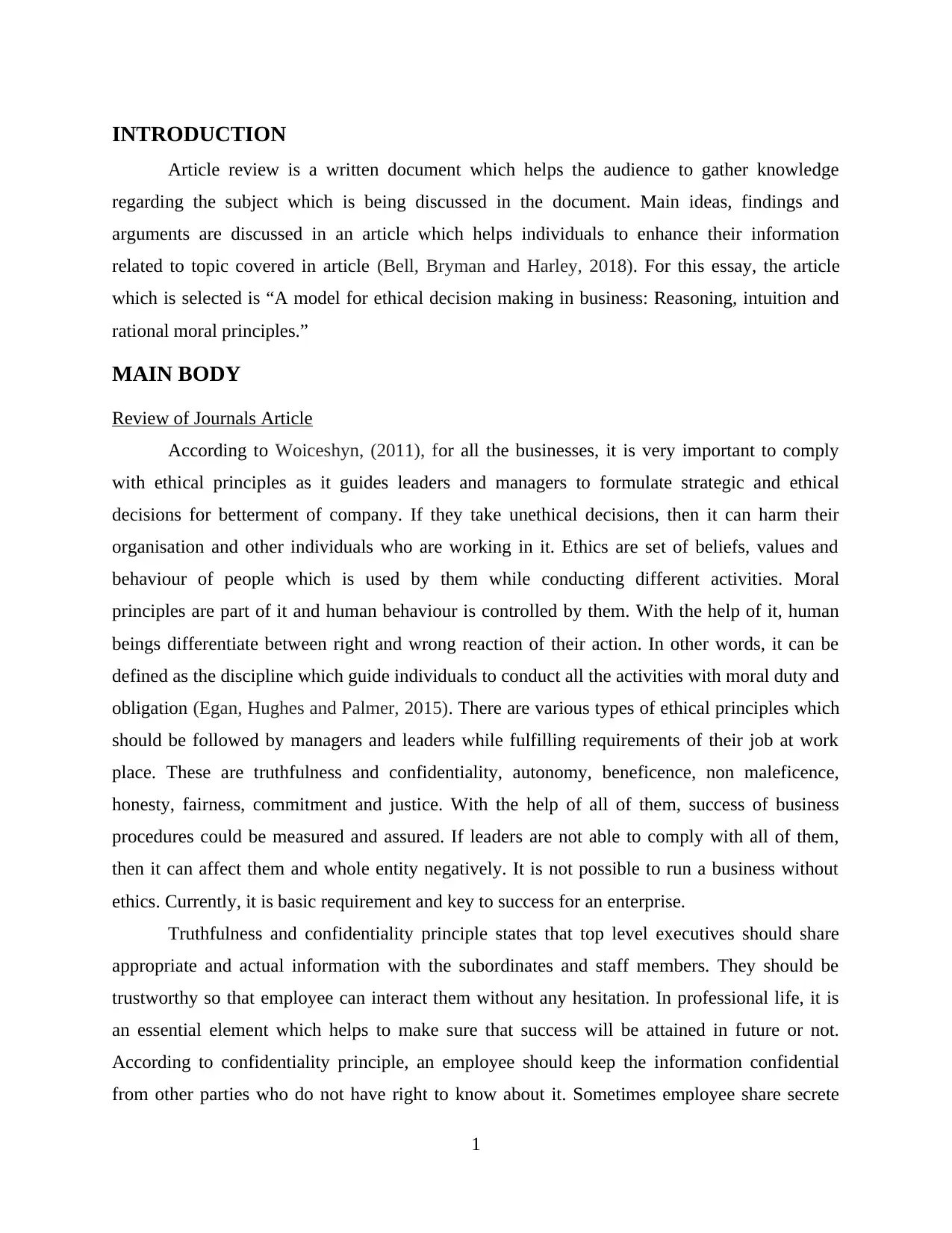
INTRODUCTION
Article review is a written document which helps the audience to gather knowledge
regarding the subject which is being discussed in the document. Main ideas, findings and
arguments are discussed in an article which helps individuals to enhance their information
related to topic covered in article (Bell, Bryman and Harley, 2018). For this essay, the article
which is selected is “A model for ethical decision making in business: Reasoning, intuition and
rational moral principles.”
MAIN BODY
Review of Journals Article
According to Woiceshyn, (2011), for all the businesses, it is very important to comply
with ethical principles as it guides leaders and managers to formulate strategic and ethical
decisions for betterment of company. If they take unethical decisions, then it can harm their
organisation and other individuals who are working in it. Ethics are set of beliefs, values and
behaviour of people which is used by them while conducting different activities. Moral
principles are part of it and human behaviour is controlled by them. With the help of it, human
beings differentiate between right and wrong reaction of their action. In other words, it can be
defined as the discipline which guide individuals to conduct all the activities with moral duty and
obligation (Egan, Hughes and Palmer, 2015). There are various types of ethical principles which
should be followed by managers and leaders while fulfilling requirements of their job at work
place. These are truthfulness and confidentiality, autonomy, beneficence, non maleficence,
honesty, fairness, commitment and justice. With the help of all of them, success of business
procedures could be measured and assured. If leaders are not able to comply with all of them,
then it can affect them and whole entity negatively. It is not possible to run a business without
ethics. Currently, it is basic requirement and key to success for an enterprise.
Truthfulness and confidentiality principle states that top level executives should share
appropriate and actual information with the subordinates and staff members. They should be
trustworthy so that employee can interact them without any hesitation. In professional life, it is
an essential element which helps to make sure that success will be attained in future or not.
According to confidentiality principle, an employee should keep the information confidential
from other parties who do not have right to know about it. Sometimes employee share secrete
1
Article review is a written document which helps the audience to gather knowledge
regarding the subject which is being discussed in the document. Main ideas, findings and
arguments are discussed in an article which helps individuals to enhance their information
related to topic covered in article (Bell, Bryman and Harley, 2018). For this essay, the article
which is selected is “A model for ethical decision making in business: Reasoning, intuition and
rational moral principles.”
MAIN BODY
Review of Journals Article
According to Woiceshyn, (2011), for all the businesses, it is very important to comply
with ethical principles as it guides leaders and managers to formulate strategic and ethical
decisions for betterment of company. If they take unethical decisions, then it can harm their
organisation and other individuals who are working in it. Ethics are set of beliefs, values and
behaviour of people which is used by them while conducting different activities. Moral
principles are part of it and human behaviour is controlled by them. With the help of it, human
beings differentiate between right and wrong reaction of their action. In other words, it can be
defined as the discipline which guide individuals to conduct all the activities with moral duty and
obligation (Egan, Hughes and Palmer, 2015). There are various types of ethical principles which
should be followed by managers and leaders while fulfilling requirements of their job at work
place. These are truthfulness and confidentiality, autonomy, beneficence, non maleficence,
honesty, fairness, commitment and justice. With the help of all of them, success of business
procedures could be measured and assured. If leaders are not able to comply with all of them,
then it can affect them and whole entity negatively. It is not possible to run a business without
ethics. Currently, it is basic requirement and key to success for an enterprise.
Truthfulness and confidentiality principle states that top level executives should share
appropriate and actual information with the subordinates and staff members. They should be
trustworthy so that employee can interact them without any hesitation. In professional life, it is
an essential element which helps to make sure that success will be attained in future or not.
According to confidentiality principle, an employee should keep the information confidential
from other parties who do not have right to know about it. Sometimes employee share secrete
1
⊘ This is a preview!⊘
Do you want full access?
Subscribe today to unlock all pages.

Trusted by 1+ million students worldwide
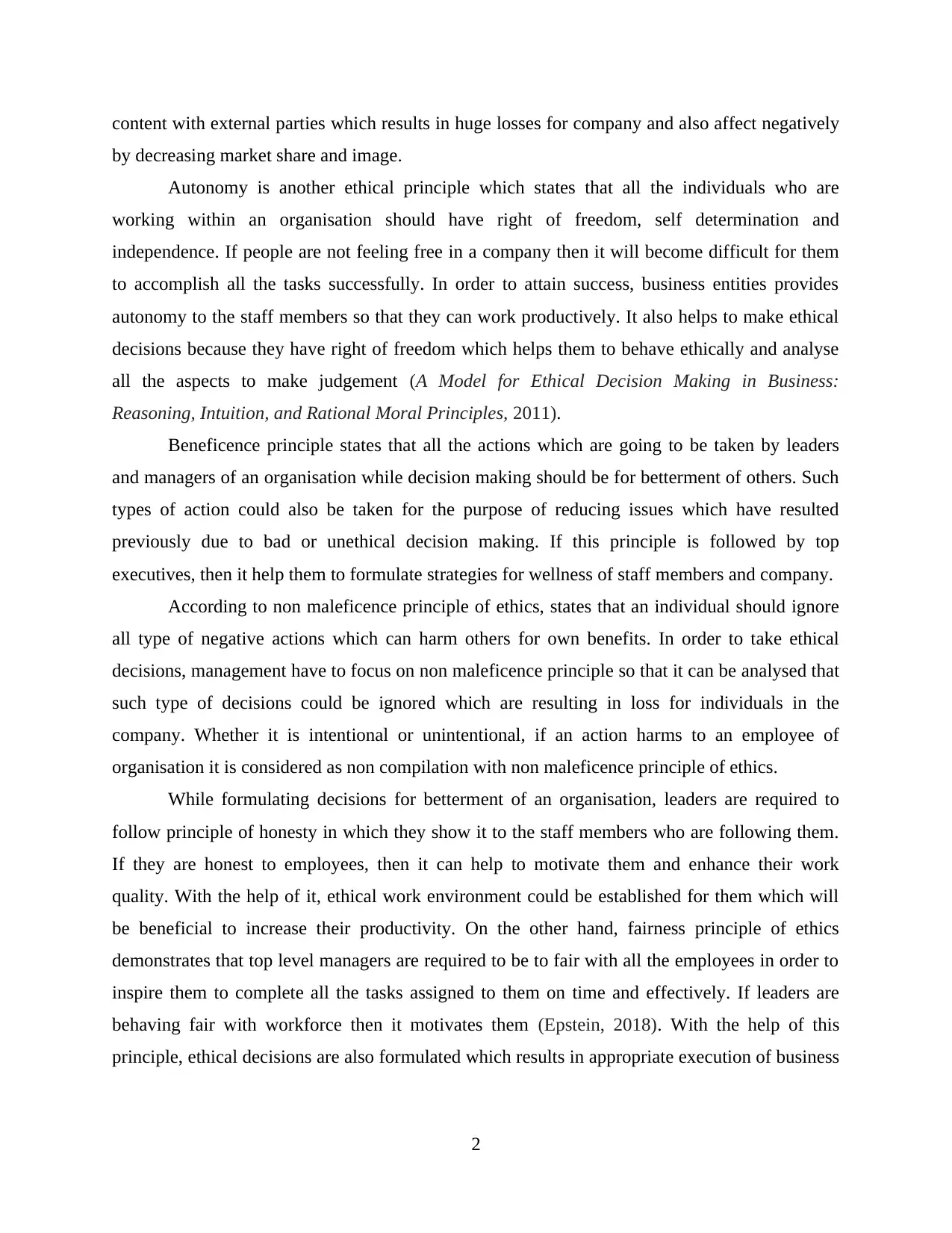
content with external parties which results in huge losses for company and also affect negatively
by decreasing market share and image.
Autonomy is another ethical principle which states that all the individuals who are
working within an organisation should have right of freedom, self determination and
independence. If people are not feeling free in a company then it will become difficult for them
to accomplish all the tasks successfully. In order to attain success, business entities provides
autonomy to the staff members so that they can work productively. It also helps to make ethical
decisions because they have right of freedom which helps them to behave ethically and analyse
all the aspects to make judgement (A Model for Ethical Decision Making in Business:
Reasoning, Intuition, and Rational Moral Principles, 2011).
Beneficence principle states that all the actions which are going to be taken by leaders
and managers of an organisation while decision making should be for betterment of others. Such
types of action could also be taken for the purpose of reducing issues which have resulted
previously due to bad or unethical decision making. If this principle is followed by top
executives, then it help them to formulate strategies for wellness of staff members and company.
According to non maleficence principle of ethics, states that an individual should ignore
all type of negative actions which can harm others for own benefits. In order to take ethical
decisions, management have to focus on non maleficence principle so that it can be analysed that
such type of decisions could be ignored which are resulting in loss for individuals in the
company. Whether it is intentional or unintentional, if an action harms to an employee of
organisation it is considered as non compilation with non maleficence principle of ethics.
While formulating decisions for betterment of an organisation, leaders are required to
follow principle of honesty in which they show it to the staff members who are following them.
If they are honest to employees, then it can help to motivate them and enhance their work
quality. With the help of it, ethical work environment could be established for them which will
be beneficial to increase their productivity. On the other hand, fairness principle of ethics
demonstrates that top level managers are required to be to fair with all the employees in order to
inspire them to complete all the tasks assigned to them on time and effectively. If leaders are
behaving fair with workforce then it motivates them (Epstein, 2018). With the help of this
principle, ethical decisions are also formulated which results in appropriate execution of business
2
by decreasing market share and image.
Autonomy is another ethical principle which states that all the individuals who are
working within an organisation should have right of freedom, self determination and
independence. If people are not feeling free in a company then it will become difficult for them
to accomplish all the tasks successfully. In order to attain success, business entities provides
autonomy to the staff members so that they can work productively. It also helps to make ethical
decisions because they have right of freedom which helps them to behave ethically and analyse
all the aspects to make judgement (A Model for Ethical Decision Making in Business:
Reasoning, Intuition, and Rational Moral Principles, 2011).
Beneficence principle states that all the actions which are going to be taken by leaders
and managers of an organisation while decision making should be for betterment of others. Such
types of action could also be taken for the purpose of reducing issues which have resulted
previously due to bad or unethical decision making. If this principle is followed by top
executives, then it help them to formulate strategies for wellness of staff members and company.
According to non maleficence principle of ethics, states that an individual should ignore
all type of negative actions which can harm others for own benefits. In order to take ethical
decisions, management have to focus on non maleficence principle so that it can be analysed that
such type of decisions could be ignored which are resulting in loss for individuals in the
company. Whether it is intentional or unintentional, if an action harms to an employee of
organisation it is considered as non compilation with non maleficence principle of ethics.
While formulating decisions for betterment of an organisation, leaders are required to
follow principle of honesty in which they show it to the staff members who are following them.
If they are honest to employees, then it can help to motivate them and enhance their work
quality. With the help of it, ethical work environment could be established for them which will
be beneficial to increase their productivity. On the other hand, fairness principle of ethics
demonstrates that top level managers are required to be to fair with all the employees in order to
inspire them to complete all the tasks assigned to them on time and effectively. If leaders are
behaving fair with workforce then it motivates them (Epstein, 2018). With the help of this
principle, ethical decisions are also formulated which results in appropriate execution of business
2
Paraphrase This Document
Need a fresh take? Get an instant paraphrase of this document with our AI Paraphraser
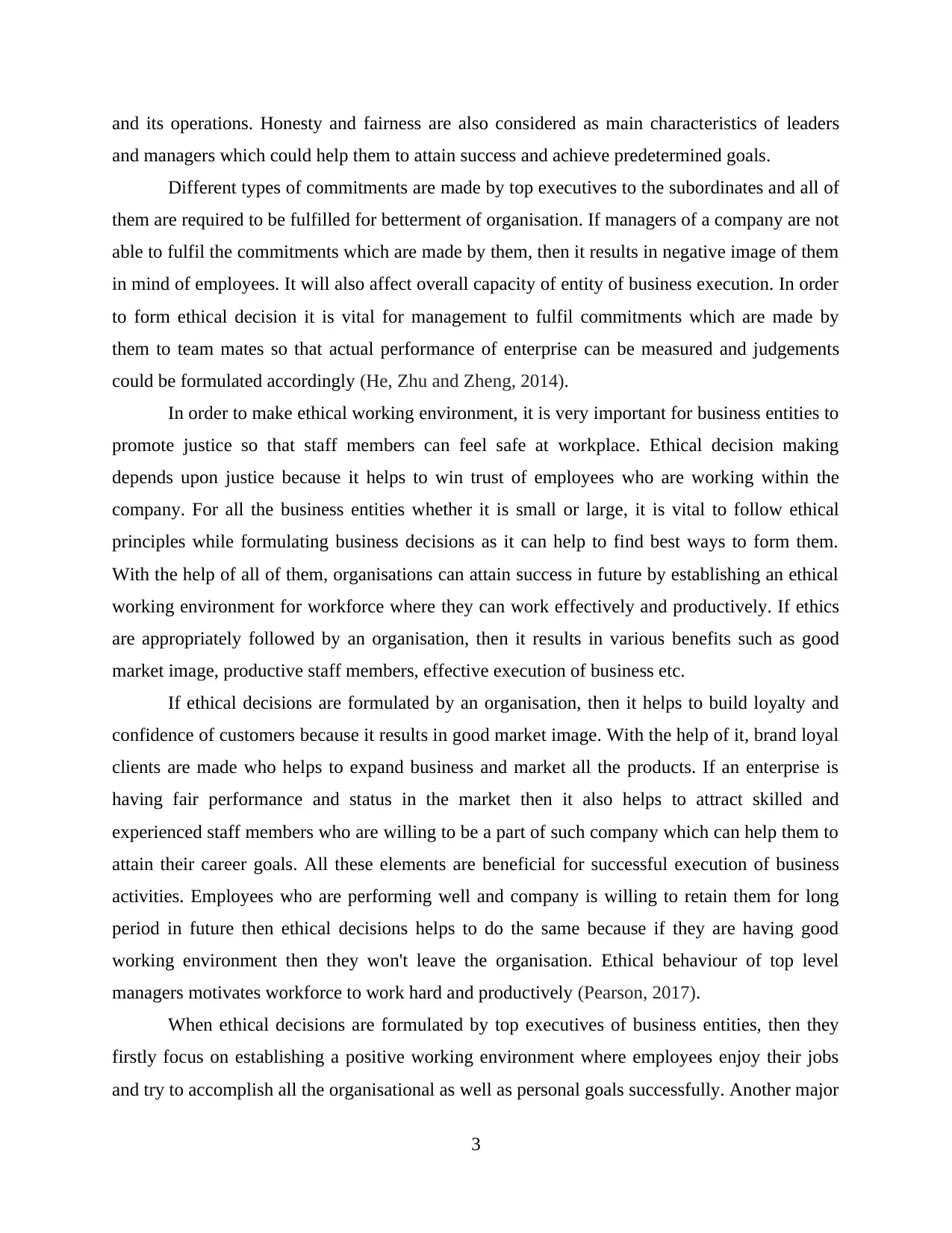
and its operations. Honesty and fairness are also considered as main characteristics of leaders
and managers which could help them to attain success and achieve predetermined goals.
Different types of commitments are made by top executives to the subordinates and all of
them are required to be fulfilled for betterment of organisation. If managers of a company are not
able to fulfil the commitments which are made by them, then it results in negative image of them
in mind of employees. It will also affect overall capacity of entity of business execution. In order
to form ethical decision it is vital for management to fulfil commitments which are made by
them to team mates so that actual performance of enterprise can be measured and judgements
could be formulated accordingly (He, Zhu and Zheng, 2014).
In order to make ethical working environment, it is very important for business entities to
promote justice so that staff members can feel safe at workplace. Ethical decision making
depends upon justice because it helps to win trust of employees who are working within the
company. For all the business entities whether it is small or large, it is vital to follow ethical
principles while formulating business decisions as it can help to find best ways to form them.
With the help of all of them, organisations can attain success in future by establishing an ethical
working environment for workforce where they can work effectively and productively. If ethics
are appropriately followed by an organisation, then it results in various benefits such as good
market image, productive staff members, effective execution of business etc.
If ethical decisions are formulated by an organisation, then it helps to build loyalty and
confidence of customers because it results in good market image. With the help of it, brand loyal
clients are made who helps to expand business and market all the products. If an enterprise is
having fair performance and status in the market then it also helps to attract skilled and
experienced staff members who are willing to be a part of such company which can help them to
attain their career goals. All these elements are beneficial for successful execution of business
activities. Employees who are performing well and company is willing to retain them for long
period in future then ethical decisions helps to do the same because if they are having good
working environment then they won't leave the organisation. Ethical behaviour of top level
managers motivates workforce to work hard and productively (Pearson, 2017).
When ethical decisions are formulated by top executives of business entities, then they
firstly focus on establishing a positive working environment where employees enjoy their jobs
and try to accomplish all the organisational as well as personal goals successfully. Another major
3
and managers which could help them to attain success and achieve predetermined goals.
Different types of commitments are made by top executives to the subordinates and all of
them are required to be fulfilled for betterment of organisation. If managers of a company are not
able to fulfil the commitments which are made by them, then it results in negative image of them
in mind of employees. It will also affect overall capacity of entity of business execution. In order
to form ethical decision it is vital for management to fulfil commitments which are made by
them to team mates so that actual performance of enterprise can be measured and judgements
could be formulated accordingly (He, Zhu and Zheng, 2014).
In order to make ethical working environment, it is very important for business entities to
promote justice so that staff members can feel safe at workplace. Ethical decision making
depends upon justice because it helps to win trust of employees who are working within the
company. For all the business entities whether it is small or large, it is vital to follow ethical
principles while formulating business decisions as it can help to find best ways to form them.
With the help of all of them, organisations can attain success in future by establishing an ethical
working environment for workforce where they can work effectively and productively. If ethics
are appropriately followed by an organisation, then it results in various benefits such as good
market image, productive staff members, effective execution of business etc.
If ethical decisions are formulated by an organisation, then it helps to build loyalty and
confidence of customers because it results in good market image. With the help of it, brand loyal
clients are made who helps to expand business and market all the products. If an enterprise is
having fair performance and status in the market then it also helps to attract skilled and
experienced staff members who are willing to be a part of such company which can help them to
attain their career goals. All these elements are beneficial for successful execution of business
activities. Employees who are performing well and company is willing to retain them for long
period in future then ethical decisions helps to do the same because if they are having good
working environment then they won't leave the organisation. Ethical behaviour of top level
managers motivates workforce to work hard and productively (Pearson, 2017).
When ethical decisions are formulated by top executives of business entities, then they
firstly focus on establishing a positive working environment where employees enjoy their jobs
and try to accomplish all the organisational as well as personal goals successfully. Another major
3
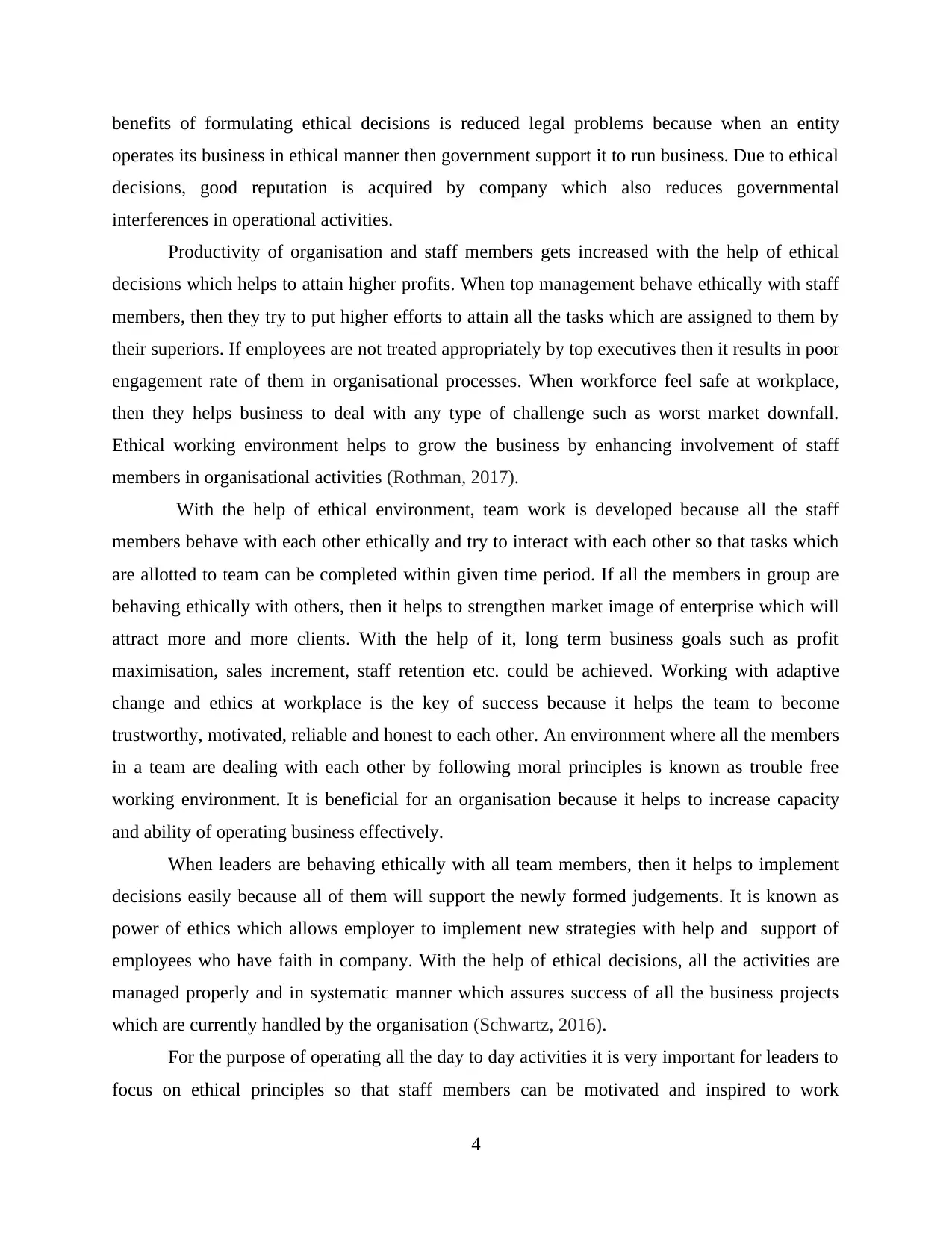
benefits of formulating ethical decisions is reduced legal problems because when an entity
operates its business in ethical manner then government support it to run business. Due to ethical
decisions, good reputation is acquired by company which also reduces governmental
interferences in operational activities.
Productivity of organisation and staff members gets increased with the help of ethical
decisions which helps to attain higher profits. When top management behave ethically with staff
members, then they try to put higher efforts to attain all the tasks which are assigned to them by
their superiors. If employees are not treated appropriately by top executives then it results in poor
engagement rate of them in organisational processes. When workforce feel safe at workplace,
then they helps business to deal with any type of challenge such as worst market downfall.
Ethical working environment helps to grow the business by enhancing involvement of staff
members in organisational activities (Rothman, 2017).
With the help of ethical environment, team work is developed because all the staff
members behave with each other ethically and try to interact with each other so that tasks which
are allotted to team can be completed within given time period. If all the members in group are
behaving ethically with others, then it helps to strengthen market image of enterprise which will
attract more and more clients. With the help of it, long term business goals such as profit
maximisation, sales increment, staff retention etc. could be achieved. Working with adaptive
change and ethics at workplace is the key of success because it helps the team to become
trustworthy, motivated, reliable and honest to each other. An environment where all the members
in a team are dealing with each other by following moral principles is known as trouble free
working environment. It is beneficial for an organisation because it helps to increase capacity
and ability of operating business effectively.
When leaders are behaving ethically with all team members, then it helps to implement
decisions easily because all of them will support the newly formed judgements. It is known as
power of ethics which allows employer to implement new strategies with help and support of
employees who have faith in company. With the help of ethical decisions, all the activities are
managed properly and in systematic manner which assures success of all the business projects
which are currently handled by the organisation (Schwartz, 2016).
For the purpose of operating all the day to day activities it is very important for leaders to
focus on ethical principles so that staff members can be motivated and inspired to work
4
operates its business in ethical manner then government support it to run business. Due to ethical
decisions, good reputation is acquired by company which also reduces governmental
interferences in operational activities.
Productivity of organisation and staff members gets increased with the help of ethical
decisions which helps to attain higher profits. When top management behave ethically with staff
members, then they try to put higher efforts to attain all the tasks which are assigned to them by
their superiors. If employees are not treated appropriately by top executives then it results in poor
engagement rate of them in organisational processes. When workforce feel safe at workplace,
then they helps business to deal with any type of challenge such as worst market downfall.
Ethical working environment helps to grow the business by enhancing involvement of staff
members in organisational activities (Rothman, 2017).
With the help of ethical environment, team work is developed because all the staff
members behave with each other ethically and try to interact with each other so that tasks which
are allotted to team can be completed within given time period. If all the members in group are
behaving ethically with others, then it helps to strengthen market image of enterprise which will
attract more and more clients. With the help of it, long term business goals such as profit
maximisation, sales increment, staff retention etc. could be achieved. Working with adaptive
change and ethics at workplace is the key of success because it helps the team to become
trustworthy, motivated, reliable and honest to each other. An environment where all the members
in a team are dealing with each other by following moral principles is known as trouble free
working environment. It is beneficial for an organisation because it helps to increase capacity
and ability of operating business effectively.
When leaders are behaving ethically with all team members, then it helps to implement
decisions easily because all of them will support the newly formed judgements. It is known as
power of ethics which allows employer to implement new strategies with help and support of
employees who have faith in company. With the help of ethical decisions, all the activities are
managed properly and in systematic manner which assures success of all the business projects
which are currently handled by the organisation (Schwartz, 2016).
For the purpose of operating all the day to day activities it is very important for leaders to
focus on ethical principles so that staff members can be motivated and inspired to work
4
⊘ This is a preview!⊘
Do you want full access?
Subscribe today to unlock all pages.

Trusted by 1+ million students worldwide
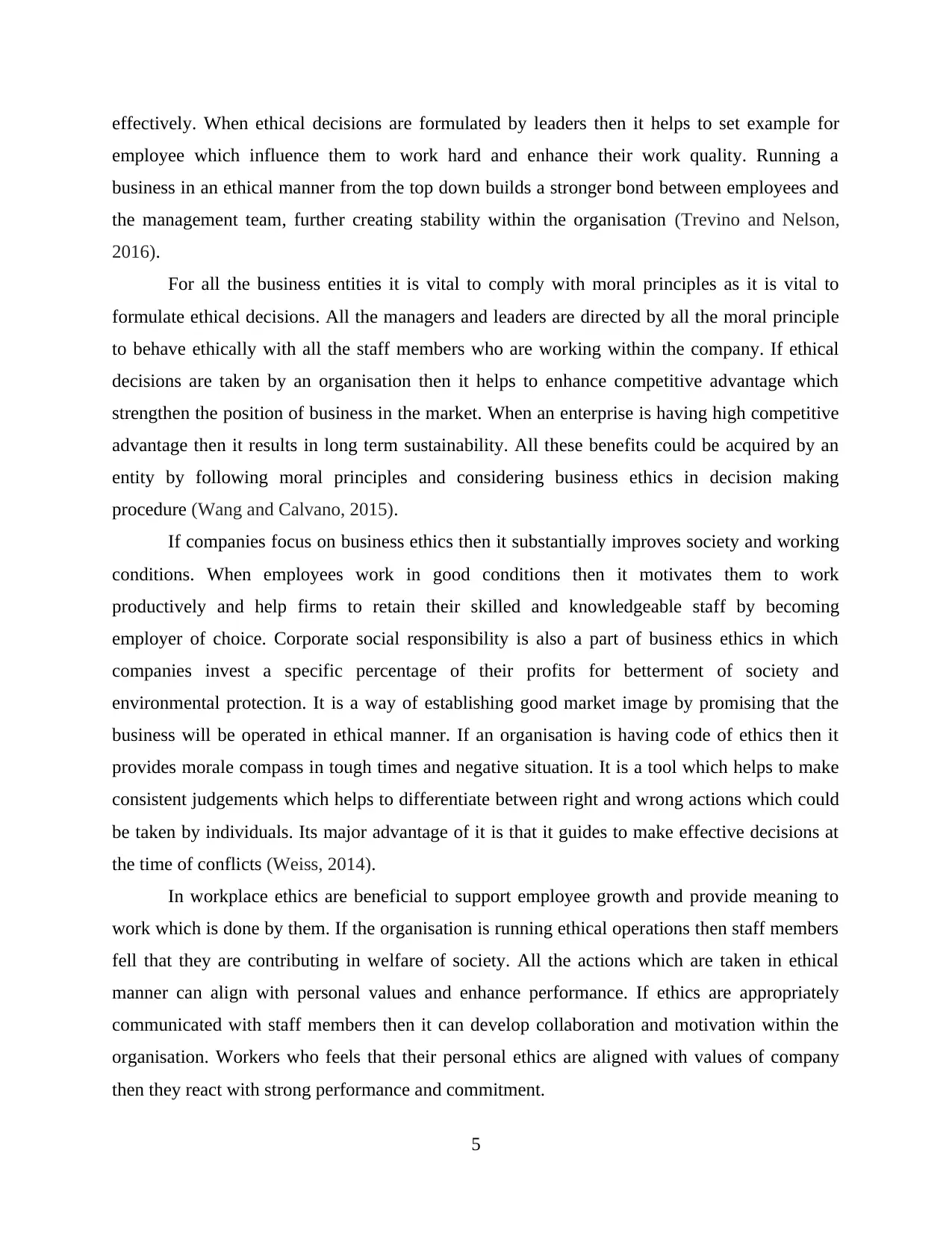
effectively. When ethical decisions are formulated by leaders then it helps to set example for
employee which influence them to work hard and enhance their work quality. Running a
business in an ethical manner from the top down builds a stronger bond between employees and
the management team, further creating stability within the organisation (Trevino and Nelson,
2016).
For all the business entities it is vital to comply with moral principles as it is vital to
formulate ethical decisions. All the managers and leaders are directed by all the moral principle
to behave ethically with all the staff members who are working within the company. If ethical
decisions are taken by an organisation then it helps to enhance competitive advantage which
strengthen the position of business in the market. When an enterprise is having high competitive
advantage then it results in long term sustainability. All these benefits could be acquired by an
entity by following moral principles and considering business ethics in decision making
procedure (Wang and Calvano, 2015).
If companies focus on business ethics then it substantially improves society and working
conditions. When employees work in good conditions then it motivates them to work
productively and help firms to retain their skilled and knowledgeable staff by becoming
employer of choice. Corporate social responsibility is also a part of business ethics in which
companies invest a specific percentage of their profits for betterment of society and
environmental protection. It is a way of establishing good market image by promising that the
business will be operated in ethical manner. If an organisation is having code of ethics then it
provides morale compass in tough times and negative situation. It is a tool which helps to make
consistent judgements which helps to differentiate between right and wrong actions which could
be taken by individuals. Its major advantage of it is that it guides to make effective decisions at
the time of conflicts (Weiss, 2014).
In workplace ethics are beneficial to support employee growth and provide meaning to
work which is done by them. If the organisation is running ethical operations then staff members
fell that they are contributing in welfare of society. All the actions which are taken in ethical
manner can align with personal values and enhance performance. If ethics are appropriately
communicated with staff members then it can develop collaboration and motivation within the
organisation. Workers who feels that their personal ethics are aligned with values of company
then they react with strong performance and commitment.
5
employee which influence them to work hard and enhance their work quality. Running a
business in an ethical manner from the top down builds a stronger bond between employees and
the management team, further creating stability within the organisation (Trevino and Nelson,
2016).
For all the business entities it is vital to comply with moral principles as it is vital to
formulate ethical decisions. All the managers and leaders are directed by all the moral principle
to behave ethically with all the staff members who are working within the company. If ethical
decisions are taken by an organisation then it helps to enhance competitive advantage which
strengthen the position of business in the market. When an enterprise is having high competitive
advantage then it results in long term sustainability. All these benefits could be acquired by an
entity by following moral principles and considering business ethics in decision making
procedure (Wang and Calvano, 2015).
If companies focus on business ethics then it substantially improves society and working
conditions. When employees work in good conditions then it motivates them to work
productively and help firms to retain their skilled and knowledgeable staff by becoming
employer of choice. Corporate social responsibility is also a part of business ethics in which
companies invest a specific percentage of their profits for betterment of society and
environmental protection. It is a way of establishing good market image by promising that the
business will be operated in ethical manner. If an organisation is having code of ethics then it
provides morale compass in tough times and negative situation. It is a tool which helps to make
consistent judgements which helps to differentiate between right and wrong actions which could
be taken by individuals. Its major advantage of it is that it guides to make effective decisions at
the time of conflicts (Weiss, 2014).
In workplace ethics are beneficial to support employee growth and provide meaning to
work which is done by them. If the organisation is running ethical operations then staff members
fell that they are contributing in welfare of society. All the actions which are taken in ethical
manner can align with personal values and enhance performance. If ethics are appropriately
communicated with staff members then it can develop collaboration and motivation within the
organisation. Workers who feels that their personal ethics are aligned with values of company
then they react with strong performance and commitment.
5
Paraphrase This Document
Need a fresh take? Get an instant paraphrase of this document with our AI Paraphraser
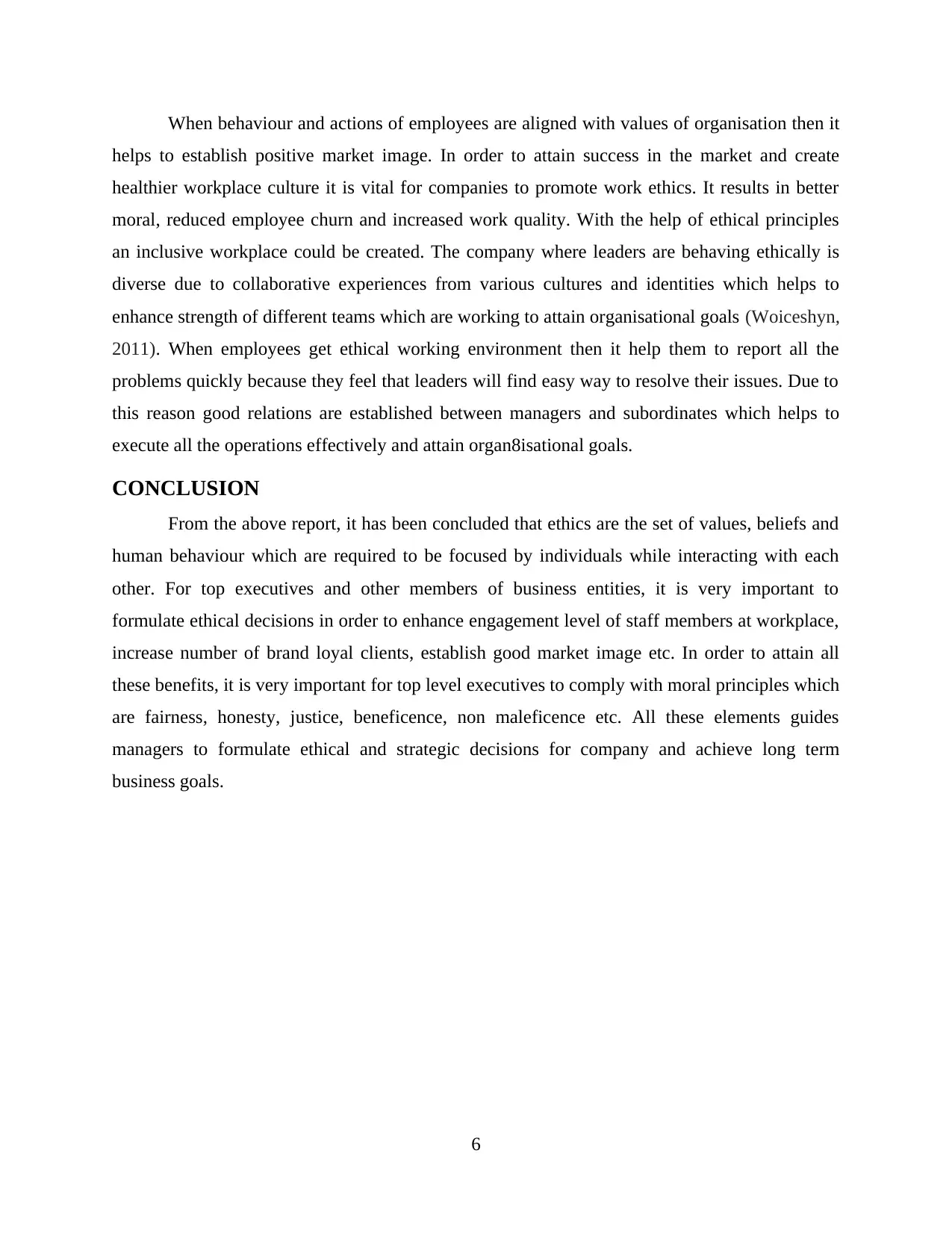
When behaviour and actions of employees are aligned with values of organisation then it
helps to establish positive market image. In order to attain success in the market and create
healthier workplace culture it is vital for companies to promote work ethics. It results in better
moral, reduced employee churn and increased work quality. With the help of ethical principles
an inclusive workplace could be created. The company where leaders are behaving ethically is
diverse due to collaborative experiences from various cultures and identities which helps to
enhance strength of different teams which are working to attain organisational goals (Woiceshyn,
2011). When employees get ethical working environment then it help them to report all the
problems quickly because they feel that leaders will find easy way to resolve their issues. Due to
this reason good relations are established between managers and subordinates which helps to
execute all the operations effectively and attain organ8isational goals.
CONCLUSION
From the above report, it has been concluded that ethics are the set of values, beliefs and
human behaviour which are required to be focused by individuals while interacting with each
other. For top executives and other members of business entities, it is very important to
formulate ethical decisions in order to enhance engagement level of staff members at workplace,
increase number of brand loyal clients, establish good market image etc. In order to attain all
these benefits, it is very important for top level executives to comply with moral principles which
are fairness, honesty, justice, beneficence, non maleficence etc. All these elements guides
managers to formulate ethical and strategic decisions for company and achieve long term
business goals.
6
helps to establish positive market image. In order to attain success in the market and create
healthier workplace culture it is vital for companies to promote work ethics. It results in better
moral, reduced employee churn and increased work quality. With the help of ethical principles
an inclusive workplace could be created. The company where leaders are behaving ethically is
diverse due to collaborative experiences from various cultures and identities which helps to
enhance strength of different teams which are working to attain organisational goals (Woiceshyn,
2011). When employees get ethical working environment then it help them to report all the
problems quickly because they feel that leaders will find easy way to resolve their issues. Due to
this reason good relations are established between managers and subordinates which helps to
execute all the operations effectively and attain organ8isational goals.
CONCLUSION
From the above report, it has been concluded that ethics are the set of values, beliefs and
human behaviour which are required to be focused by individuals while interacting with each
other. For top executives and other members of business entities, it is very important to
formulate ethical decisions in order to enhance engagement level of staff members at workplace,
increase number of brand loyal clients, establish good market image etc. In order to attain all
these benefits, it is very important for top level executives to comply with moral principles which
are fairness, honesty, justice, beneficence, non maleficence etc. All these elements guides
managers to formulate ethical and strategic decisions for company and achieve long term
business goals.
6
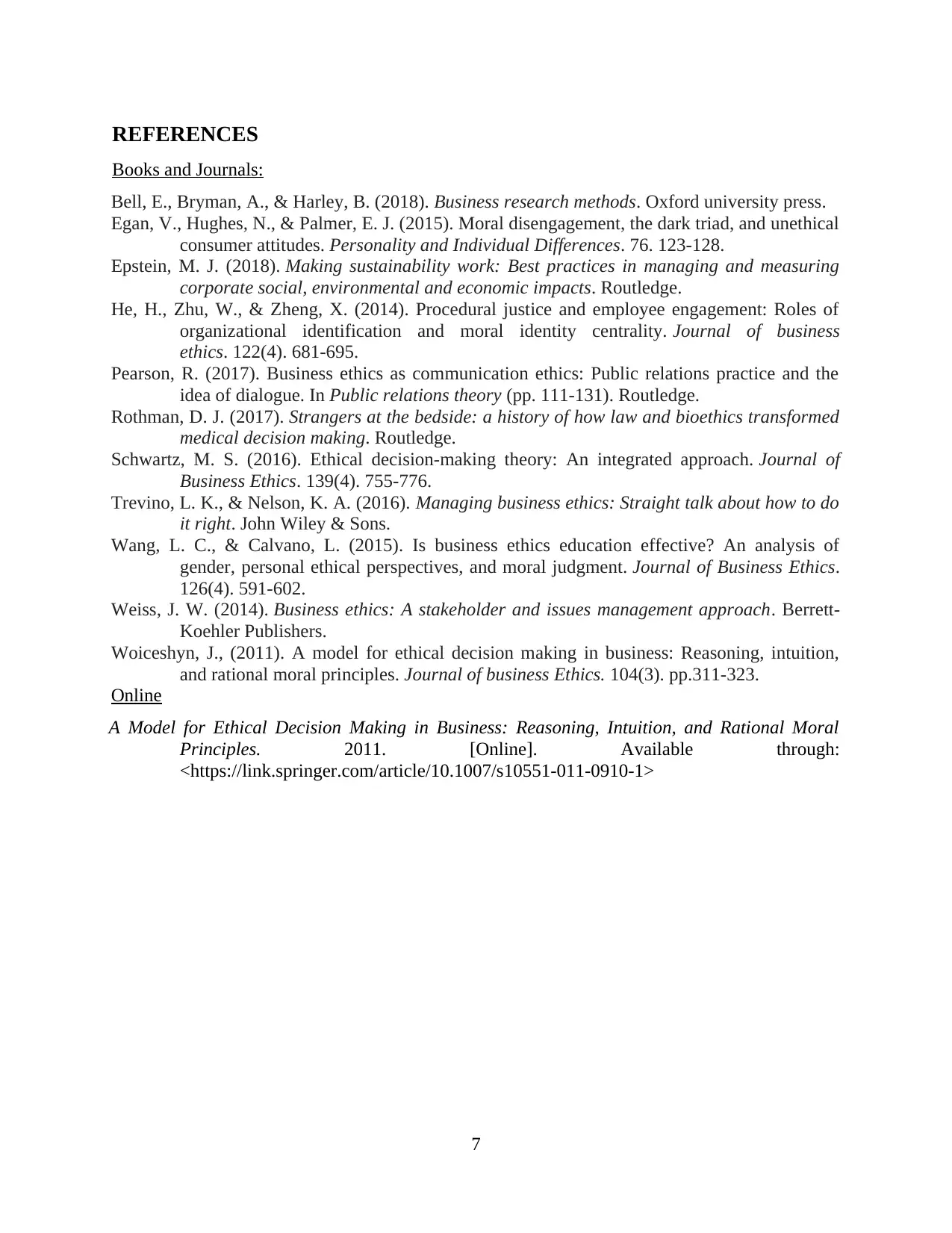
REFERENCES
Books and Journals:
Bell, E., Bryman, A., & Harley, B. (2018). Business research methods. Oxford university press.
Egan, V., Hughes, N., & Palmer, E. J. (2015). Moral disengagement, the dark triad, and unethical
consumer attitudes. Personality and Individual Differences. 76. 123-128.
Epstein, M. J. (2018). Making sustainability work: Best practices in managing and measuring
corporate social, environmental and economic impacts. Routledge.
He, H., Zhu, W., & Zheng, X. (2014). Procedural justice and employee engagement: Roles of
organizational identification and moral identity centrality. Journal of business
ethics. 122(4). 681-695.
Pearson, R. (2017). Business ethics as communication ethics: Public relations practice and the
idea of dialogue. In Public relations theory (pp. 111-131). Routledge.
Rothman, D. J. (2017). Strangers at the bedside: a history of how law and bioethics transformed
medical decision making. Routledge.
Schwartz, M. S. (2016). Ethical decision-making theory: An integrated approach. Journal of
Business Ethics. 139(4). 755-776.
Trevino, L. K., & Nelson, K. A. (2016). Managing business ethics: Straight talk about how to do
it right. John Wiley & Sons.
Wang, L. C., & Calvano, L. (2015). Is business ethics education effective? An analysis of
gender, personal ethical perspectives, and moral judgment. Journal of Business Ethics.
126(4). 591-602.
Weiss, J. W. (2014). Business ethics: A stakeholder and issues management approach. Berrett-
Koehler Publishers.
Woiceshyn, J., (2011). A model for ethical decision making in business: Reasoning, intuition,
and rational moral principles. Journal of business Ethics. 104(3). pp.311-323.
Online
A Model for Ethical Decision Making in Business: Reasoning, Intuition, and Rational Moral
Principles. 2011. [Online]. Available through:
<https://link.springer.com/article/10.1007/s10551-011-0910-1>
7
Books and Journals:
Bell, E., Bryman, A., & Harley, B. (2018). Business research methods. Oxford university press.
Egan, V., Hughes, N., & Palmer, E. J. (2015). Moral disengagement, the dark triad, and unethical
consumer attitudes. Personality and Individual Differences. 76. 123-128.
Epstein, M. J. (2018). Making sustainability work: Best practices in managing and measuring
corporate social, environmental and economic impacts. Routledge.
He, H., Zhu, W., & Zheng, X. (2014). Procedural justice and employee engagement: Roles of
organizational identification and moral identity centrality. Journal of business
ethics. 122(4). 681-695.
Pearson, R. (2017). Business ethics as communication ethics: Public relations practice and the
idea of dialogue. In Public relations theory (pp. 111-131). Routledge.
Rothman, D. J. (2017). Strangers at the bedside: a history of how law and bioethics transformed
medical decision making. Routledge.
Schwartz, M. S. (2016). Ethical decision-making theory: An integrated approach. Journal of
Business Ethics. 139(4). 755-776.
Trevino, L. K., & Nelson, K. A. (2016). Managing business ethics: Straight talk about how to do
it right. John Wiley & Sons.
Wang, L. C., & Calvano, L. (2015). Is business ethics education effective? An analysis of
gender, personal ethical perspectives, and moral judgment. Journal of Business Ethics.
126(4). 591-602.
Weiss, J. W. (2014). Business ethics: A stakeholder and issues management approach. Berrett-
Koehler Publishers.
Woiceshyn, J., (2011). A model for ethical decision making in business: Reasoning, intuition,
and rational moral principles. Journal of business Ethics. 104(3). pp.311-323.
Online
A Model for Ethical Decision Making in Business: Reasoning, Intuition, and Rational Moral
Principles. 2011. [Online]. Available through:
<https://link.springer.com/article/10.1007/s10551-011-0910-1>
7
⊘ This is a preview!⊘
Do you want full access?
Subscribe today to unlock all pages.

Trusted by 1+ million students worldwide
1 out of 9
Related Documents
Your All-in-One AI-Powered Toolkit for Academic Success.
+13062052269
info@desklib.com
Available 24*7 on WhatsApp / Email
![[object Object]](/_next/static/media/star-bottom.7253800d.svg)
Unlock your academic potential
Copyright © 2020–2025 A2Z Services. All Rights Reserved. Developed and managed by ZUCOL.




